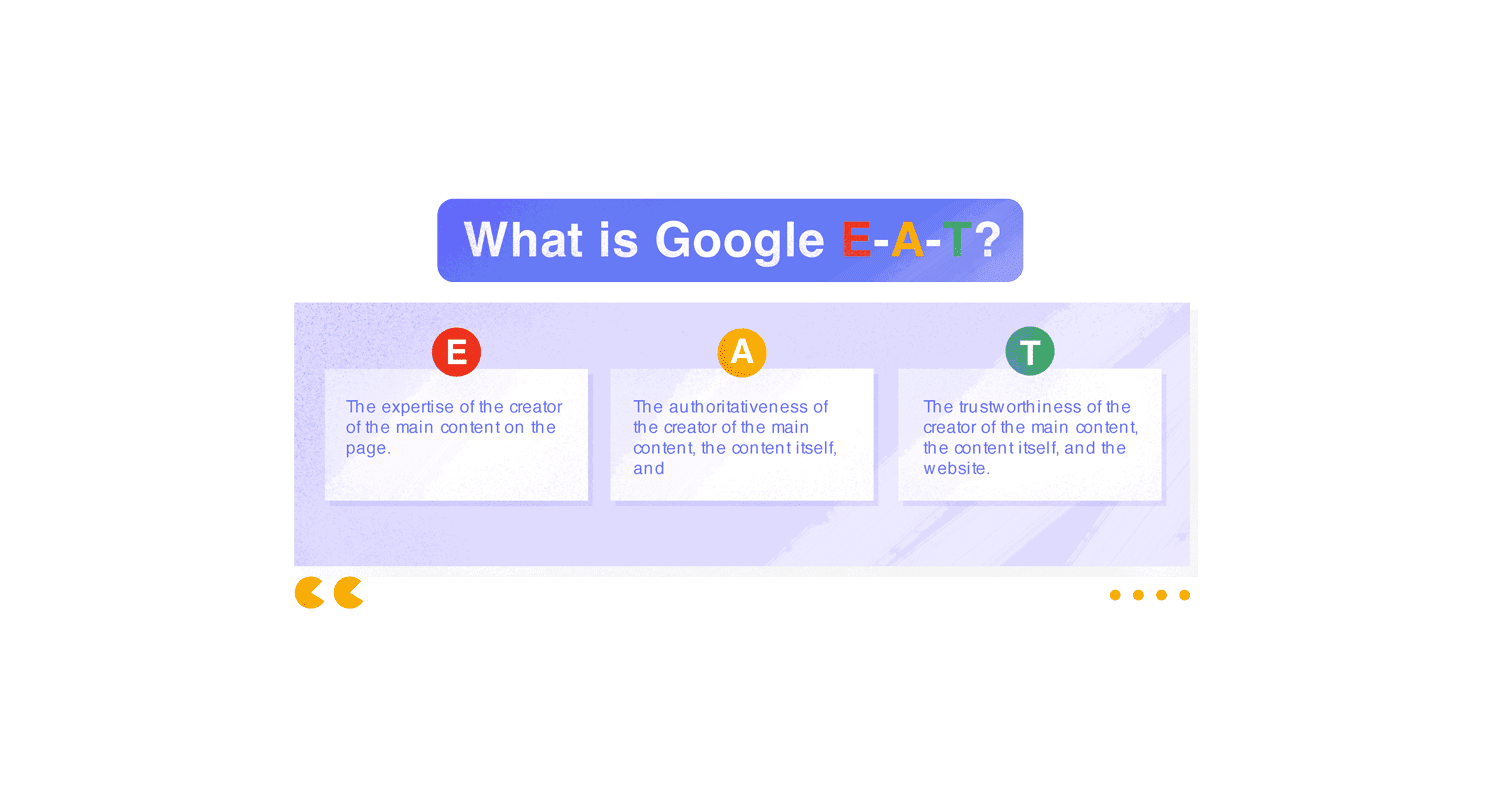Learn how to optimize content material and construct belief

[ad_1]
Thanks for subscribing!
Google rewards websites that produce high-quality content material as a result of they have a tendency to have the most effective solutions to related queries. The 2 major ideas that Google makes use of to evaluate content material high quality and worth to readers are EAT and YMYL. On this article, we’ll check out each of those ideas and learn the way they’ll have an effect on rankings.
What’s EAT
EAT is an acronym for Experience, Authoritativeness, and Trustworthiness. It’s a mixture of particular alerts that Google considers when evaluating web page belief and high quality. EAT is foundational to Google’s High quality Ranking Tips.

Google considers a web page to be excessive in high quality if it fulfills these three parameters. If customers prefer it simply as a lot as Google does, the web page will then compete with the best rating pages on the SERP for a similar or related search queries. Which means that EAT parameters (together with different rating components) instantly have an effect on the web page’s place on the SERP.
Let’s outline every half.
Experience
This indicator alerts to Google that the content material creator in query is a reliable skilled with confirmed expertise—or isn’t. Google favors content material written by subject material consultants—folks with a deep understanding and expertise in a given subject. Google’s raters will fairly actually scour the web for background info on authors and their publications, even when the publication is on a common subject, like a culinary weblog publish.
Authoritativeness
Google assesses the authoritativeness of the creator, the primary content material of the web page, and the web site. It’ll test if the creator’s experience is acknowledged by different business consultants and if the web site has a dependable repute amongst them. The authoritativeness rating is calculated by the variety of backlinks from different sources and related alerts. This consists of mentions in articles, evaluations, references, or some other sort of quotation.
Trustworthiness
Google measures the integrity (extra generally often called trustworthiness) of the creator, the web page’s primary content material, and the web site. Trustworthiness is decided by a number of belief components. A fantastic instance of those components is the credentials on the web page: awards, testimonials, endorsements, and many others.
EAT incentivizes authors to display their experience, authoritativeness, and trustworthiness, particularly when writing about authorized, monetary, or medical matters. For instance, medical recommendation must be written or produced by folks or organizations with applicable medical experience or accreditation.
This leads us to Google’s different essential idea—YMYL. Let’s discover out what it’s.
What’s YMYL
Some matters could have an effect on customers’ well being, monetary well-being, and security. This might embody medical or monetary portals, or on-line shops. Google refers to those matters as Your Cash or Your Life sources, or YMYL for brief. Google will think about a website YMYL even when the positioning offers only one piece of recommendation on an essential determination a consumer is about to make. Google double-checks YMYL websites to verify they don’t comprise inaccurate info and are usually not dangerous to customers.
All matters may be roughly divided into clear, potential, or unlikely YMYL matters, relying on how doubtless it’s to trigger hurt. By default, most matters are thought of not-YMYL and don’t require particular consideration relating to accuracy or belief.
In keeping with Google’s tips, a subject is taken into account YMYL if it may well doubtlessly have an effect on:
- Well being or security: psychological, bodily, and emotional well being; any type of security
- Monetary safety: an individual’s capacity to supply for themselves and their households
- Society: notion of teams of individuals, problems with public curiosity, belief in public establishments
- Different: any matters the place inaccurate information might hurt folks or worsen their well-being
Dangerous pages should seem in non-harmful matters. These pages must be red-flagged and rated as low high quality and doubtlessly dangerous, even when the web site as a complete has a optimistic repute.
How EAT and YMYL are related
Now, let’s match these two ideas. First, we beforehand talked about that better authority and belief scores may help with increased rankings on Google. However don’t take our phrase for it. Hear it from the tech large itself.
We’ve very excessive Web page High quality score requirements for YMYL pages as a result of low-quality YMYL pages might doubtlessly negatively influence an individual’s happiness, well being, monetary stability, or security.
Any web site producing content material associated to finance is checked out carefully by the search evaluator, so that you completely MUST work in your EAT rating if you happen to personal a YMYL subject useful resource. For instance, let’s think about that you simply’re engaged on a YMYL useful resource. It could possibly be a web site for an accountancy agency that publishes tax planning and funding recommendation. Customers that find yourself in your web site must be assured that the recommendation you present gained’t result in mistaken monetary choices and/or dropping cash.
Solely folks or organizations with applicable monetary experience and accreditation ought to produce tax recommendation or supplies on some other YMYL matters, however there are some exceptions. Authors don’t want credentials in the event that they’re simply telling a private story or sharing their very own experiences. Supplies like “How I earned my first million” or “How we handle taxes in our firm” are thought of on a regular basis experience in YMYL matters and require much less formal experience.
A low EAT rating would possibly stop your website from rating excessive. Web sites that don’t take note of readers’ well-being when creating content material danger not showing on Google for essential key phrases.
Even when your website isn’t thought of YMYL, it’s best to nonetheless attempt to work on the EAT rating as a result of a excessive EAT rating signifies a high-quality web site. All the time hold the well-being of your customers in thoughts and think about any potential impact your web site could have on them. Solely present YMYL info that’s fastidiously fact-checked by consultants. If for any purpose you’ll want to discuss one thing which may be dangerous, warn folks concerning the subject’s potential dangers and unfavourable penalties.
The evolution of EAT and YMYL
EAT first appeared in 2014 when Google launched its Search High quality Evaluator Tips. At the moment, the entire idea was obscure and it wasn’t clear how Google was going to make use of qualitative components for calculating quantitative rankings. And whereas customers regarded for explanations, Google remained brief on solutions.
Google acknowledged: The quantity of experience, authoritativeness, and trustworthiness is essential.
EAT and YMYL survived a number of main Google updates:
- In August 2018, Google rolled out an enormous core algorithms replace. Quickly after that, many YMYL sources skilled a major drop in rankings. There weren’t any particulars on the updates, however it was apparent that the replace was primarily about Google’s capacity to find out the EAT rating and establish probably the most reliable web sites.
- In June 2019, one other main replace affected the notion of EAT. A number of web sites with excessive authority scores skilled a critical drop in rankings shortly after the replace occurred. This proved that EAT isn’t assigned to the whole area, however decided for every explicit URL. In different phrases, EAT must be thought of one in every of over 200 web page high quality parameters.
- In October 2020, Google made some essential edits to the Search High quality Evaluator Tips. Particularly, Google clarified that EAT scores don’t instantly influence the order of search outcomes. It additionally emphasised how essential understanding the consumer intent and question is for scores. Moreover, some minor modifications have been made to the rules—some explanations and examples have been up to date.
- In October 2021, Google launched new modifications to the Search High quality Evaluator Tips. It expanded a number of definitions within the YMYL class and up to date steering on methods to do analysis on web sites and on the repute of content material creators. Moreover, Google up to date and clarified Lowest Web page High quality part.
- The final main replace occurred In July 2022. Google revised this doc to align it with the newly printed Search High quality Rater Tips: An Overview. It clarified the YMYL classification (Clear YMYL/Could also be YMYL/Not or unlikely YMYL), added new examples, and refreshed explanations on methods to perceive whether or not the subject on a given website or websites is taken into account YMYL (whether or not it requires a excessive degree of accuracy to forestall important hurt). Moreover, the replace launched an evidence on Low and Lowest Web page High quality sections, clarifying that the extent of E-A-T relies on the aim of the web page, so any sort of web site may be thought of low high quality or dangerous.
Even immediately, EAT and YMYL stay a sizzling subject of debate. Though Search High quality Evaluator Tips is a priceless supply of data on EAT, it’s only a working doc for evaluators—not an precise guidebook.
Be sure that to make use of this info with warning.
Is EAT a rating issue
Regardless of the large influence that EAT has on the web page high quality rating and rankings, most website positioning consultants agree that EAT is just not a full-fledged rating issue. No less than not but.

Danny Sullivan
Public Liaison for Search at Google
Is E-A-T a rating issue? Not if you happen to imply there’s some technical factor like with velocity that we are able to measure instantly. We do use a wide range of alerts as a proxy to inform if content material appears to match E-A-T as people would assess it. In that regard, yeah, it’s a rating issue.
The principle drawback with EAT is that it’s a qualitative parameter, not a quantitive one. Which means that to be thought of a rating issue, EAT must be calculated algorithmically. There’s additionally at the moment no singular EAT rating assignable to a web site. As a substitute, EAT serves as a selected sign to different Google rating algorithms on methods to behave with a web site.

Ben Gomes
SVP of Training at Google
You may view the rater tips as the place we would like the search algorithm to go. They don’t let you know how the algorithm is rating outcomes, however they essentially present what the algorithm ought to do.
However, Google has already began working in direction of turning EAT right into a numeric rating issue. There have been a number of concepts on methods to make it doable. Let’s begin with the best and doubtless most blatant ones. Google pays folks to evaluate web sites. These raters assess the utility and high quality of content material in accordance with experience, authoritativeness, and trustworthiness. In idea, they assign an general rating that may be included in rating algorithms.

Danny Sullivan
Public Liaison for Search at Google
Our techniques aren’t in search of EAT. Our raters are utilizing that to see if our techniques are working properly to indicate good info. There are various completely different alerts that, if we get it proper, align with what a great human EAT evaluation could be.
One other thought is to calculate the quantity and context of mentions or hyperlinks to the web page or creator. Principally, hyperlinks are nice alerts of the content material’s trustworthiness. For YMYL matters, the repute of a web site or content material creator must be judged by the variety of mentions from consultants within the business. Suggestions from professional sources, corresponding to skilled on-line communities, are robust proof of a really optimistic repute.
However there are additionally some extra subtle options. Google has a patent for know-how that may calculate the credibility of an creator of on-line content material. In keeping with the outline, the repute rating can embody two or extra sub-scores, the place every sub-score pertains to a unique high quality of the web content material merchandise. The repute rating may be additional based mostly on the variety of hyperlinks the web content material merchandise has from different on-line content material. It may be additional based mostly on how lengthy an creator has been an authenticated creator.
EAT, as you’ll be able to see, is an idea and not a rating issue. However Google clearly sees EAT and YMYL as essential elements of Google’s future algorithms. EAT could at some point turn into a rating issue.
Learn how to optimize EAT on YMYL pages
Producing high-quality content material is usually a lofty job by itself. Ensuring your web site is reliable to guests provides a complete new layer of complexity, particularly for site owners who personal YMYL sources. There are a number of pretty easy but efficient methods to optimize net pages for higher EAT.
- Create distinctive and high quality content material. Distinctive and high-quality content material written for folks (not only for engines like google) makes a giant distinction. To persuade Google that you simply’re an professional, it’s important to perceive your target market’s pursuits and supply priceless info in a snug manner. Maintain your content material up-to-date by periodically revising and adjusting present texts.
- Preserve the creator’s visibility. Readers gained’t belief your YMYL content material if you happen to don’t reveal the creator’s fundamental credentials—on the very least. Readers will need to know who created the article and with whom they’ll discuss to if they’ve questions. That’s why it’s a should to maintain the creator seen, particularly on YMYL websites. Take into account, that in accordance with Google tips, each web page on a web site ought to have details about who’s accountable for the web site and who created the content material on the web page (particular person, firm, enterprise, basis, and many others.).
- For particular person authors and content material creators, create separate pages with biographical info, hyperlinks to their social media accounts or private web sites, CVs, or skilled certificates as proof of repute. Writer Schema is an effective way to disambiguate details about the creator on the net web page. Not solely is it straightforward to make use of, however it additionally hurries up the time it takes for engines like google to search out details about the creator. Additionally, don’t overlook to hyperlink up pages utilizing supplies from the identical creator.
- Get mentions on authoritative websites. A wise link-building technique can considerably enhance your web site’s repute not solely from a technical standpoint (consider the PageRank algorithm, for instance) but in addition within the eyes of your readers. Which means that a hyperlink from a extremely acclaimed authoritative web site will move a few of its authority and model recognition to a different web site. Within the context of EAT, it’s a good suggestion to get backlinks to your creator’s pages as properly. Discover web sites which have a particular bio part and organize it in an effort to get backlinks to your creator’s web page.
- Add belief components throughout the positioning. Belief components are a set of particular options or components that assist enhance the trustworthiness of your website relative to each customers and engines like google. To get top-ranking positions, incorporate as many belief components in your website as doable. For instance, create and replace an About Us web page by describing your achievements, including certificates and diplomas, and even displaying a portfolio and evaluations from actual clients.
Remaining ideas
Experience, Authoritativeness, and Trustworthiness of content material are essential for web page high quality. Though they aren’t direct quantitative components, they’ve a qualitative influence on a web page’s capacity to rank. EAT parameters are particularly essential for sources that have an effect on folks’s well being, well-being, and security—the so-called YMYL sources.
Set a objective to extend the possibilities that your content material will rank properly. Strive to determine methods to create content material that gives probably the most profit to your customers, then begin engaged on authority and constructing the belief rating of your content material. Google’s algorithms are always altering, so that you must also hold an in depth eye on any updates and align your content material with Google’s new necessities.
Keep tuned with SE Rating updates, and be at liberty to share your individual expertise with EAT within the feedback beneath.
[ad_2]
Source_link






